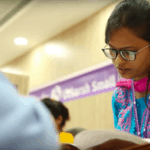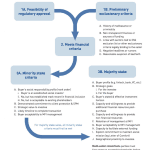Responsible Finance: Moving Money from Mattresses to Mobiles
It’s no exaggeration to say that, over the past few years, financial inclusion has experienced a revolution. New technologies have made it possible for far more people than ever – especially lower-income people living in developing and emerging-market countries – to access financial services that were previously beyond their reach.
For an organization like FINCA Impact Finance, which has been in the business of financial inclusion for nearly four decades in dozens of countries, this revolution is a cause for enormous optimism. It’s giving economically disadvantaged people ways to access capital, pay school fees, grow their businesses, create jobs and improve their standard of living. And now, it’s moving their hard-earned money from mattresses to mobiles.
This revolution has prompted a profound operational transformation for FINCA, too, as we adopt new technological and financial innovations that allow us to lower our costs and serve more customers faster and more efficiently than before.
That’s good for our customers and, frankly, for our own institution. In the Democratic Republic of the Congo, for example, we’ve offered customers mobile banking services which have reduced administrative tasks and thus given our credit staff more time to build personal relationships with clients who have more complex needs.
At the same time, we have to be sure that as we navigate this cultural and operational revolution, we preserve our core identity as a socially responsible financial services institution. We’re mindful that most of the new mobile banking solutions in developing countries are almost entirely automated and often designed to maximize profit. This raises the specter that large numbers of customers, especially those with little experience with formal financial services, could find themselves over-indebted and at the mercy of lenders who may not be interested in their long-term wellbeing.
Our own practice – and our message to our industry colleagues – is that the protection of our customers’ financial standing must be a primary objective and not an afterthought.
‘Hybrid’ approach to financial inclusion
That’s a delicate balance, to be sure, but it’s one that FINCA Impact Finance expects to strike through our “hybrid” approach to financial inclusion. With our business model, we strive to retain the personal touch we’ve applied for decades through our vast network of branches and agents, while utilizing automated credit scoring tools and digitization that are opening doors for more people.
This is the approach we’ve built into SimSim, a new smartphone app that allows Pakistanis to have access to formal banking services – often for the first time in their lives. Developed jointly by FINCA and FINJA, a Pakistani fintech, SimSim stands out in Pakistan because it is simple for Pakistanis to use (clients are able to download and open an e-wallet account in only a couple of minutes) and does not charge transaction fees. Most other mobile banking services in Pakistan require customers to wade through cumbersome processes and charge fees for nearly every transaction.
This means that a woman who works in her home in a remote region of Pakistan and has never set foot inside a bank branch can now open and use a formal e-wallet. With it, she can transfer money to relatives, invite her customers to pay her via the app, and can borrow small amounts of money. And she can do all of this without spending a single rupee for a transaction. The interface is built around graphics, enabling use by the large number of illiterate Pakistanis who currently are shut out of financial services. If she wants to deposit or withdraw cash, she can do so at one of the nearly 45,000 agents FINCA has partnered with throughout the country.
fintech empowers women
SimSim, which recently emerged from its pilot phase, has grown from approximately 4,500 wallets (representing individual users) in 2016 to more than 35,000 by the end of July 2017. In that time, it nearly doubled its transactions from 44,000 to 83,000. We are confident that we can reach a goal of 5 million wallets in 2021, a scale unheard of in the microfinance world.
The potential for social and economic transformation is enormous. Only 16 percent of the 190 million people in Pakistan have a formal bank account. However, nine out of 10 households have access to a mobile phone. Additionally, access to the internet has exploded since the launch of 3G/4G services in 2014, giving rise to 40 million mobile data users. The price of smartphones is rapidly falling (as low as the equivalent of USD $35) and more than 90 percent of the country’s adult population has a biometric national identification number, creating an environment that is poised for the launch of a new digital banking model.
At FINCA Impact Finance, we have always focused on empowering women, knowing full well they are disproportionately affected by the injustice of poverty. We’re building that focus into our launch of SimSim, especially in more rural areas of Pakistan, where vast numbers of women are unbanked. In these communities, we’re recruiting women to be ambassadors to other women. These ambassadors are helping navigate the new technology, coaching on good personal financial management and educating on how to conduct cash-in and cash-out transactions without making a long, prohibitive trek to a bank branch in a larger community.
We are only at the dawn of the new age of financial inclusion, but the transformation is inexorably progressing. There is much to be excited and optimistic about, but this exuberance must be tempered with a renewed commitment to putting our clients first and continuing to build responsible financial services that first and foremost support local communities.
Andrée Simon is CEO of FINCA Impact Finance.
Photo courtesy of FINCA Impact Finance
- Categories
- Finance, Technology



